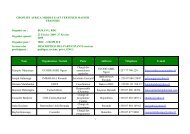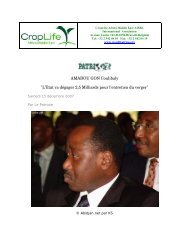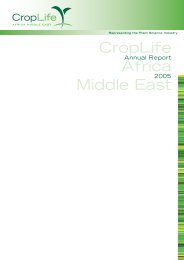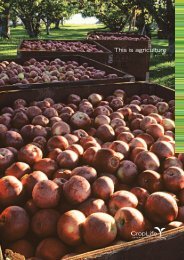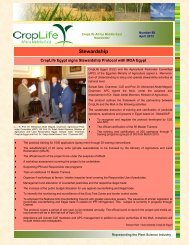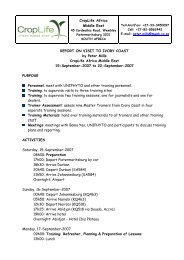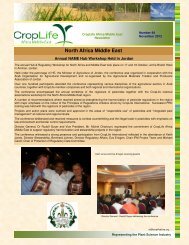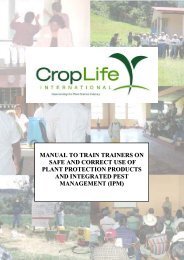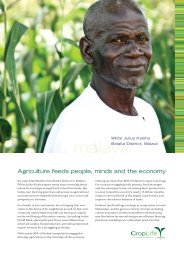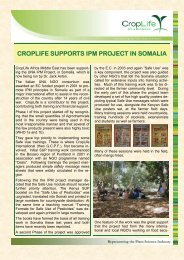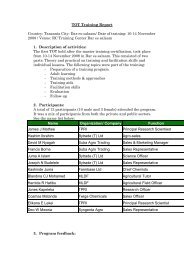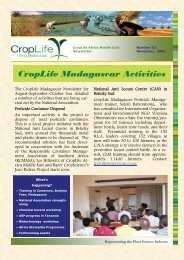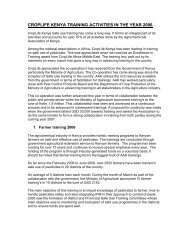Newsletter January 2013 - CropLife Africa Middle East
Newsletter January 2013 - CropLife Africa Middle East
Newsletter January 2013 - CropLife Africa Middle East
Create successful ePaper yourself
Turn your PDF publications into a flip-book with our unique Google optimized e-Paper software.
Photos: Medina FM<br />
Page 6<br />
<strong>CropLife</strong> <strong>Africa</strong> <strong>Middle</strong> <strong>East</strong> <strong>Newsletter</strong> Number 86<br />
<strong>January</strong> <strong>2013</strong><br />
Communications<br />
<strong>CropLife</strong> Morocco Communicates Via Rural Radio<br />
For the first time, <strong>CropLife</strong> Morocco is using rural radio to spread key<br />
messages on the responsible use of pesticides among farming communities.<br />
The reaction has been extremely positive and therefore <strong>CropLife</strong><br />
Morocco plans to make more use of local radio stations in the future to<br />
reach small-scale farmers.<br />
The choice of rural radio to reach farmers was obvious for <strong>CropLife</strong><br />
Morocco since the majority of farmers live in remote areas with limited<br />
access. By using rural radio, most farmers can be reached without<br />
logistical challenges.<br />
A total of ten different radio spots were aired over a period of three months<br />
at the end of 2011 and in early 2012. The items focused on different<br />
aspects of responsible use of pesticides, including Integrated Pest<br />
Management, application, storage, and the transportation of pesticides.<br />
Each spot took between 60 and 90 seconds in which only key messages<br />
were covered.<br />
The spots were broadcasted via Radio Medina FM, based in Meknes,<br />
which is in the centre of the country and in the middle of the most<br />
important agricultural region in Morocco. It is also the region where most<br />
incidents occur with pesticides. The languages used were Arabic and<br />
Berber, which are the most common languages used by small-scale<br />
farmers in Morocco. The radio spots could be heard five days a week,<br />
twice per day at 7h45 in the morning and 6h45 in the evening which is the<br />
time that most farmers are back from their fields and listen to the radio.<br />
The making and airing of the radio spots were self-financed by <strong>CropLife</strong><br />
Morocco. Ali Mohd Ali<br />
Farming First in Progress<br />
As a co-organiser, Farming First partnered with the Agriculture, Landscapes and Livelihoods Day consortium, bringing<br />
together the CGIAR, FANRPAN, WFP, IFAD, the World Bank, FAO, World Farmers Organisation and others - to promote<br />
agriculture within the broader policy discussions at the Climate Change Conference (COP18) in Doha.<br />
As part of this effort and in partnership with the CGIAR Research Program on Climate Change, Agriculture and Food Security<br />
(CCAFS), Farming First has launched its newest infographic, “The Story of Agriculture and Climate Change: The Road to COP<br />
18”. Unveiled ahead of the opening session of Agriculture, Landscapes and Livelihoods Day 5 (ALL-5 Day), it tells the history<br />
of agriculture and climate change in the UNFCCC, highlighting how discussions on agriculture are spread across the<br />
convention and the growing consensus on the need for cohesion to leverage efforts in research, knowledge sharing and<br />
financing for adaptation and mitigation.<br />
Farming First also hosted a roundtable session at ALL-5 Day on the role of public-private partnerships in reducing emission<br />
across the agro-food chain. The session highlighted best practices and technologies, with speakers discussing how farmers,<br />
businesses, NGOs and governments are collaborating to develop reliable metrics to measure how mitigation and adaptation<br />
goals are being met from farm to fork. The panel included:<br />
• Dyborn Chibonga, Chief Executive Officer, National Smallholder Farmers’ Association of Malawi<br />
• Simon Aumonier, Partner & Head of Waste Management, Energy and Climate Change Teams, Environmental<br />
Resources Management<br />
• Keith Wheeler, Co-founder of Foundation for our Future, President of IUCN Board of Directors, and Field to Market<br />
Board Member<br />
• Belinda Morris, American Carbon Registry California Director<br />
Lastly, Farming First worked with other leading agricultural organisations to promote a joint call-to-action for further<br />
consideration at the COP18 meeting for a dedicated SBSTA Work Programme on Agriculture. Other endorsers include CGIAR<br />
Consortium, World Farmers’ Organisation and the Technical Centre for Agricultural and Rural Cooperation (CTA) among<br />
others.<br />
Representing the Plant Science Industry



